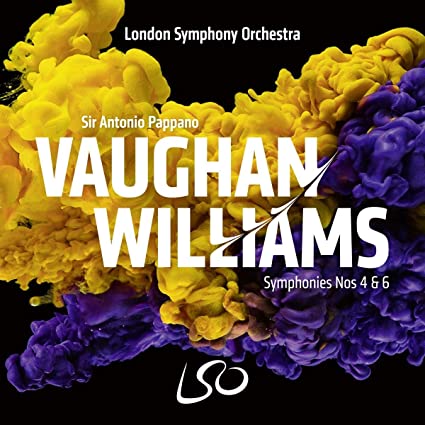
ESSENTIAL RECORDINGS

Symphony No. 4 in F Minor (1934) Symphony No 6 in E Minor (1944-1947)
Now that news headlines have confirmed that conductor Sir Antonio Pappano will become Chief Conductor Designate of the London Symphony Orchestra in September 2023, replacing Sir Simon Rattle who, disappointed by the Brexit outcome, plans to return to Germany and apply for German citizenship, we are pretty well assured that more recordings of this nature, and hopefully stature as well, lie on the horizon. If the present "live" recording is any indication we are in for some impressive music-making. Antonio Pappano was actually born in London to Italian parents. Sir Antonio Pappano has been Music Director of the Royal Opera House, Covent Garden, since 2002 and has released not only many fine Opera recordings, featuring many of today's finest singers, but also well-received recordings of orchestral music by Respighi, Rachmaninov and Prokofiev amongst others.
The two most idiomatic symphonies of Ralph Vaughan Williams (1872-1958) are showcased together on this recording. For a composer who at the onset of his career had no intention to write symphonies but in the end composed nine of some of the best examples of 20th century symphonic music, his Symphonies Nos. 4 & 6 stand as the most powerful and enigmatic (is there anything more enigmatic and inscrutable than the final movement of the Sixth) of his output.
The composer didn't leave behind any programmatic details or notes as to their underlying narrative impetus, but it's rather obvious that both symphonies are a reaction to the war, either to its ominous prospect or its devastating aftermath. From the convulsively violent opening movement of the Fourth, to its Waltonesque scherzo, to its highly complex, agitated and contrapuntal final movement which leads to a resolute and intransigent ending, it's very much the work of a composer stepping out of his comfort zone and threading new ground to great effect. Ralph Vaughan Williams had started writing music for film scores during the war and the Sixth certainly has cinematic scope to it, highly evident in its assured first movement loaded with bold orchestration touches and particularly dynamic scoring for the brass section that includes a tenor saxophone which takes the leading role a few times during the third movement. There's an overall "tip of the hat" to Gustav Holst atmosphere within this symphony, most strikingly the "Neptune" like (minus the choir of course) ending of its inscrutable final movement. And this movement in particular stands out as being masterfully shaped and controlled by Antonio Pappano and highly expressively conveyed by the musicians of the orchestra.
The recording of the Fourth took place during a concert in Barbican Hall on December 12th 2019, and the Sixth on the 15th of March 2020, the night before the first pandemic lockdown in Britain was announced. In the booklet notes the conductor states that both nights had a tangible electric energy to them. And I must say that both performances, charged with highly committed, expressive and steadfast playing, confirm that statement. Sounds like Pappano and London will be a great partnership.
Jean-Yves Duperron - April 2021